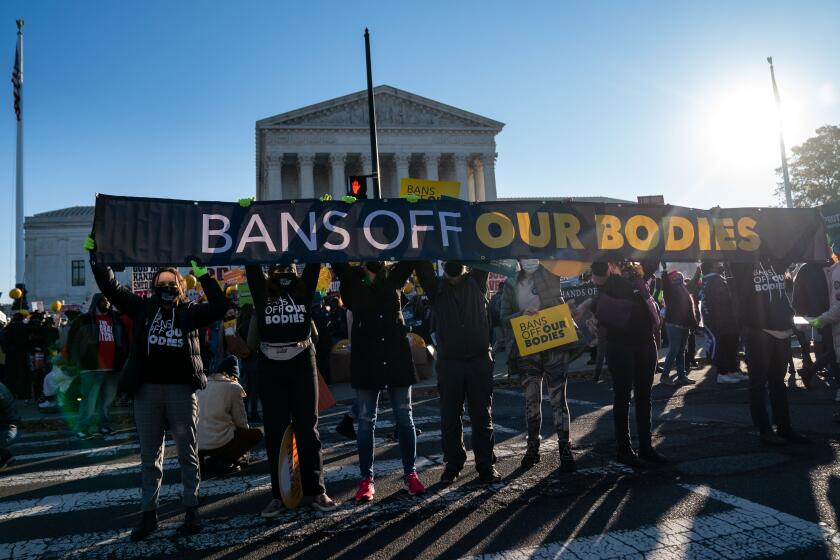In response to Texas abortion ban, Newsom calls for similar restrictions on assault weapons

- Share via
After the U.S. Supreme Court declined to block a Texas state law that bans most abortions there, Gov. Gavin Newsom said he’ll push for a new California law that deters the manufacture and sale of assault rifles in the state.
In a statement Saturday night, the governor said he was outraged by the court’s failure in a decision Friday to enforce longstanding constitutional protections in favor of abortion rights.
But by not striking down the Texas anti-abortion law, which relies on private citizens for enforcement, Newsom argued that the court has endorsed states’ ability to create similar legal mechanisms to safeguard laws from federal court review. In his statement Saturday, Newsom referred to a recent federal court decision that overturned the state’s ban on assault rifles in which the judge compared the weapons to a Swiss Army knife.
“If states can now shield their laws from review by the federal courts that compare assault weapons to Swiss Army knives, then California will use that authority to protect people’s lives, where Texas used it to put women in harm’s way,” Newsom said.
The Texas Heartbeat Act, also known as Senate Bill 8, declares that it is illegal to perform an abortion after about six weeks of a pregnancy but gives the state no direct role in enforcing that ban. Instead, it authorizes private lawsuits in state courts against doctors or clinic owners who violate its provisions.
The new California anti-gun effort, Newsom said, would function the same way. Newsom said he was directing his staff to work with the state Legislature and Atty. Gen. Rob Bonta on a new law that would allow private citizens to sue manufacturers or distributors of assault weapons as well as ghost gun kits or parts.
“If the most efficient way to keep these devastating weapons off our streets is to add the threat of private lawsuits, we should do just that,” Newsom said in the statement.
A divided Supreme Court refused Friday to block a Texas law that has banned most abortions in the state.
The governor’s pledge to pass a law restricting assault weapons through private litigation is exactly the kind of legal gambit that constitutional scholars have predicted since the Supreme Court majority declined to block the Texas abortion law, said Khiara M. Bridges, a professor at UC Berkeley School of Law.
“Gov. Newsom is following through on the threat,” Bridges said. “It’s just been academic up until now.”
Indeed, in a dissenting opinion in the Texas case in September, Chief Justice John G. Roberts Jr. warned his fellow justices that Texas’ attempt to get around prior prohibitions against abortion bans by allowing private citizens to enforce the law could provide a model for others to create comparable laws in different areas.
Assemblyman Marc Levine (D-Greenbrae) said California should be doing everything it can to prevent gun violence and applauded the governor’s intervention. He said ever since the Supreme Court first declined to block the Texas law from taking effect in September, constituents have approached him about California trying to do the same thing with guns.
“If the Supreme Court acknowledges that these types of laws are constitutional, California should exert every power necessary to protect human life,” said Levine, who has authored multiple bills on gun restrictions. “We need to have the premier leader in the state, the governor, leading on these very challenging issues.”
Under Newsom’s proposal, private citizens could sue to stop the manufacture, sale or distribution of assault weapons or ghost gun kits or parts. Plaintiffs in successful cases could receive damages of at least $10,000 per violation plus court costs and attorney’s fees. But beyond listing those penalties, Newsom gave no details in his statement about the plan.
The soonest the state Legislature could begin acting on any proposal is Jan. 3, when lawmakers reconvene in Sacramento. Should a measure ultimately pass, much would depend on the outcome of near-certain legal challenges to the effort.
Bridges, the Berkeley law professor, said that letting states write laws to avoid federal court review of people’s rights was a dangerous legal standard in any case. Nevertheless, she believed Newsom’s proposal ultimately could allow the court to correct its error in allowing private enforcement of Texas’ abortion restrictions in conflict with longstanding constitutional protections on abortions.
But no matter how California’s law is written, Bridges said, she believed the court would strike it down.
“We have six justices, and it’s looking more like five these days, who like gun rights and don’t like abortion rights,” she said. “They’re willing to disregard some precedent while venerating other precedent. I have no doubt whatsoever that the Supreme Court will find some bizarre, disingenuous argument to distinguish gun rights from abortion rights.”
Times Sacramento bureau chief John Myers contributed to this report.
More to Read
Sign up for Essential California
The most important California stories and recommendations in your inbox every morning.
You may occasionally receive promotional content from the Los Angeles Times.















